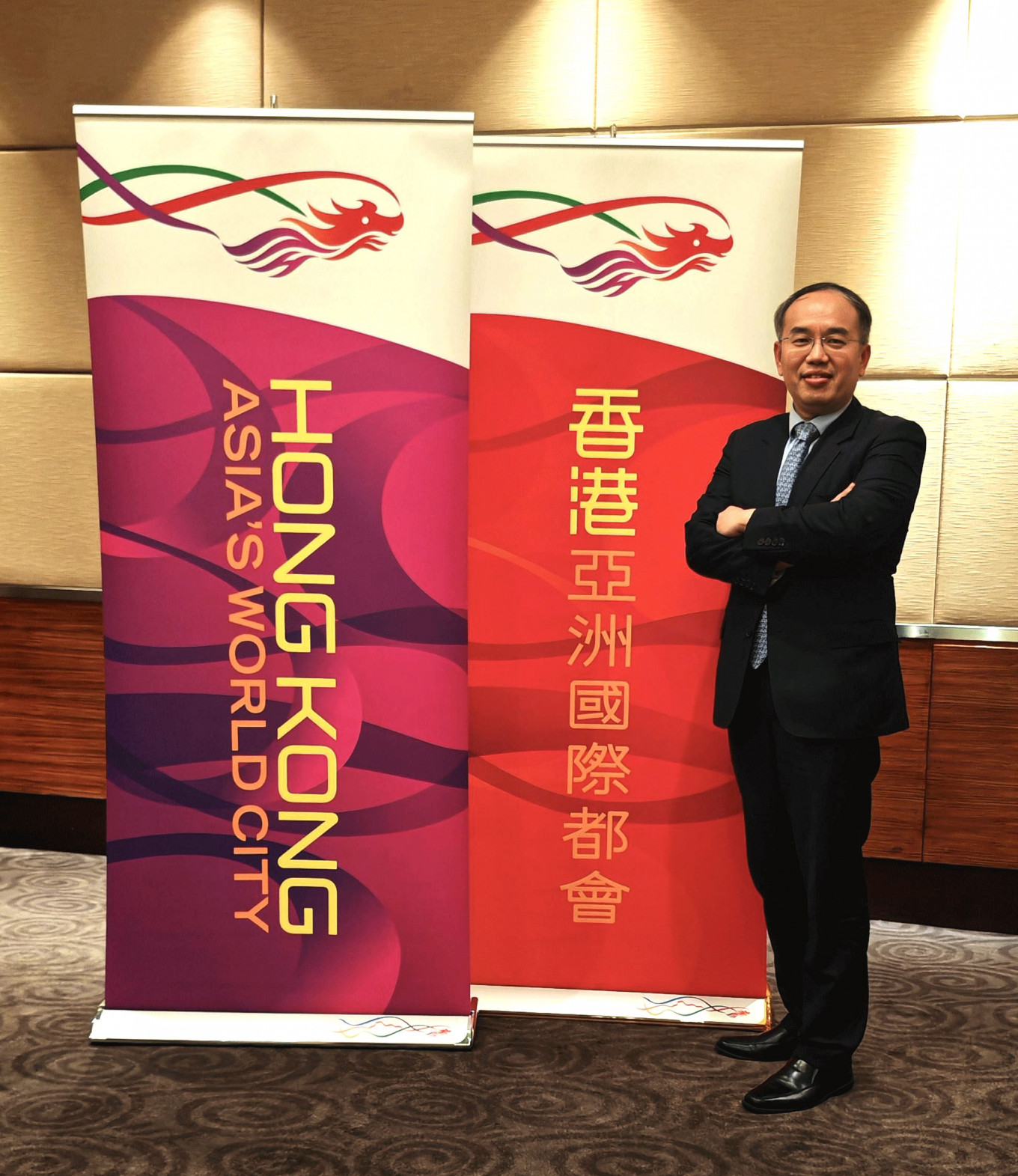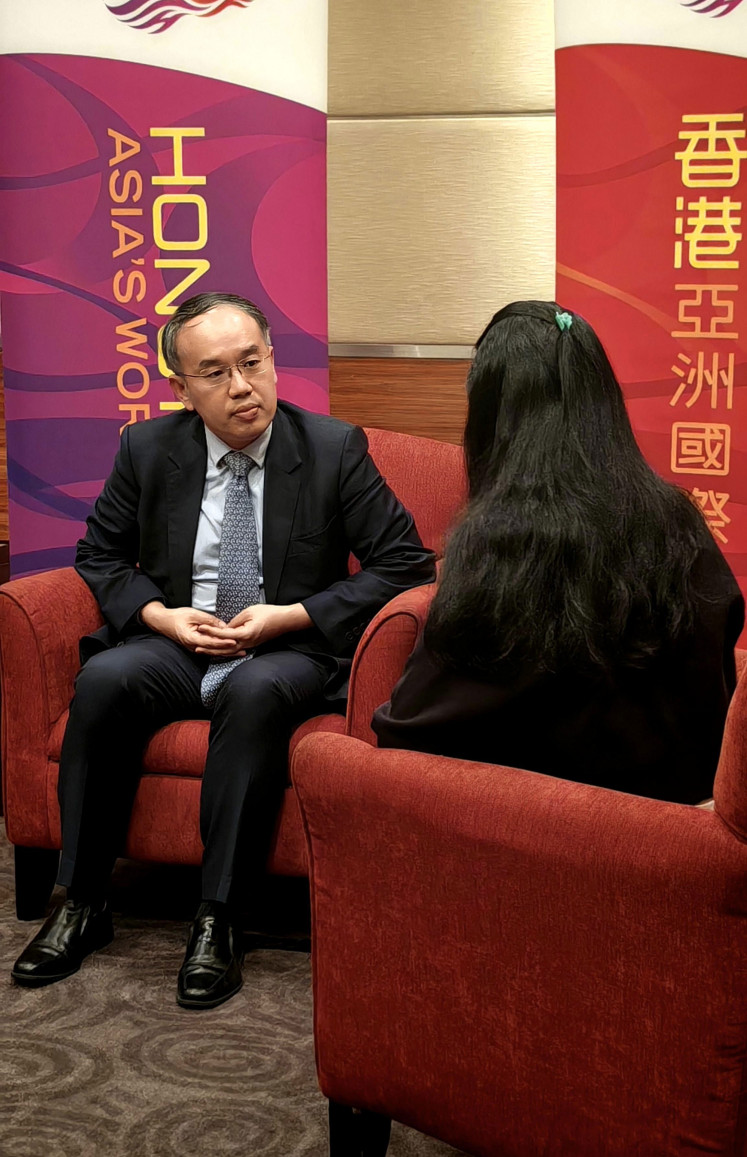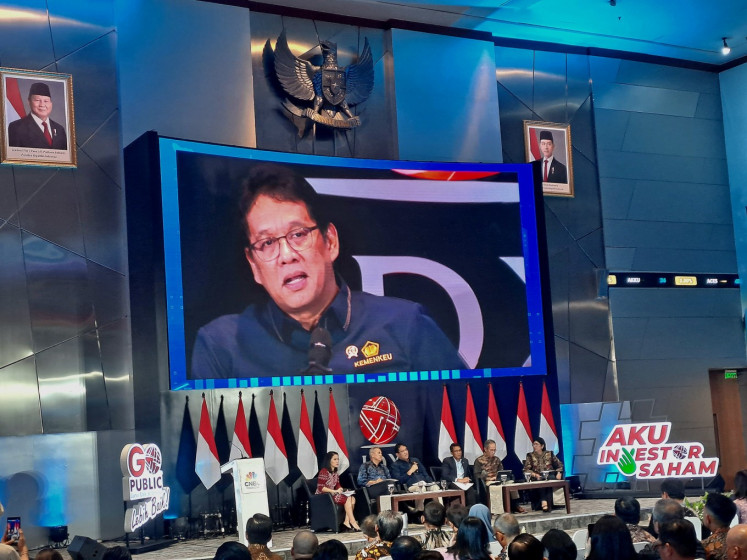Popular Reads
Top Results
Can't find what you're looking for?
View all search resultsPopular Reads
Top Results
Can't find what you're looking for?
View all search resultsHong Kong zeroes in on three things to enhance 2025
Change text size
Gift Premium Articles
to Anyone
A
s Indonesia gears up to move forward with a new administration, a foundation that must be built upon is the strategic partnership and collaboration that has been fostered over many years with reliable international partners.
The bilateral relationship between Indonesia and the Hong Kong Special Administrative Region (HKSAR) is particularly one that has been advantageous for both parties, considering Hong Kong is one of the most desirable havens for financial services for Indonesians.
A visit by Christopher Hui, Secretary for Financial Services and the Treasury of the Government of the HKSAR, this month marked the first principal official from Hong Kong to have met the new government since the swearing in of the Red and White cabinet under President Prabowo Subianto.
Amid all the important events and meetings with Indonesian officials, Hui did emphasize that the region is prioritizing the increase of family offices, sustainable financing and the use of artificial intelligence (AI) in its financial market as the New Year commences. It is hoped that Indonesia can be a valuable partner in assisting Hong Kong with these matters in any capacity.
Throughout history, those that acquire huge assets have generally taken steps to ensure that their descendants are able to live a comfortable life by inheriting wealth. Currently, many are inclined to implement a family office in order to carry on this tradition. Moreover, for most families, Hong Kong offers a strategic location in which to set up their trusts.
A perfect home for family offices
“A family office is a setup, which manages your family's wealth. And by wealth, it's not just about material wealth, but also about its heritage and legacy and also the family values. That's why in this context, I think Hong Kong and Indonesia have a lot in common because we are both cultures that are very pro-family and also at the same time a culture that respects family values and also a culture where people are very hardworking,” explained Hui.
In order to fully support the increase of family offices in Hong Kong, Hui said the government had set up measures focusing on tax concessions, introduction of an entrant scheme for capital investors and facilitating the creation of charities for those who wish to do some philanthropic work and be granted tax exemption.
Furthermore, realizing the vibrant cultural scene that is evident in Hong Kong society, coupled with the knowledge that art has served as an essential asset for some families, the airport in Hong Kong is also planning to offer art storage facilities to ensure that pieces of artwork collected are able to be stored and preserved properly. This is just an example of the measures that Hong Kong has implemented in order to further support and facilitate the setup and expansion of family offices.
“I think there are both pull and push factors for a setup in Hong Kong. For the push factors, I think one thing is how global investors want to diversify. They are not just looking for ways to diversify their asset classes away from equities and bonds but also to some alternatives like virtual assets and others,” said Hui on why Hong Kong has become increasingly attractive to set up businesses in.
One of the most inviting features is the accessibility to Chinese and international markets. The region has various connect programs with the Chinese capital markets, ranging from equities to bonds, among others, while simultaneously implementing connect programs with international markets, such as the United Kingdom in the last decade.
Regarding the pull factor, Hui emphasized the effective policies and the talent pool for financial services, which account for 24.9 percent of the total GDP of the region. Around 7 percent of the working population contains a specialized group with very wide expertise ranging from financial planning and accounting to legal and financial analysis.
“So all these are another set of pull factors, which attract family offices because after all, if they come to Hong Kong, they are not just there to manage their wealth. It is also about succession planning and so at the same time, how they can use the financial services and the professional services to further the continuation and growth of their families,” he said.
Many Indonesians have a cultural affinity with Hong Kong and China. For this trip to Indonesia, Hui is accompanied by Libera Cheng, Director-General of the Hong Kong Economic and Trade Office in Jakarta that handles clients from the archipelago and the ASEAN region as a whole.
“Some of them are either already there or planning to be there because as I said, many of them could have cultural roots in Indonesia. Many of them could be overseas Chinese here,” he said.
“In fact, my family is also from an overseas Chinese background from Indonesia and the Philippines. So, you can see that the deep cultural roots provide the connectivity that's required. That's number one. And number two, as I said, in Hong Kong, you can get access to almost half of the world's population within a five-hour flight.”
Of the 2,700 single family offices in Hong Kong, Hui revealed that more than half have assets under management exceeding US$50 million, a figure that has been set as a benchmark of sorts. Moreover, he clarifies that a single family office will have to manage at least US$30.87 million in qualifying assets to be eligible for tax concessions, and employ two people, as well as spending a total of US$257,069 a year.
Separately, investors may apply for the New Capital Investment Entrant Scheme which requires each applicant to make an investment of at least US$3.86 million. The Scheme enables eligible applicants to apply to become Hong Kong permanent residents after seven years of residence in Hong Kong.
The increase of sustainable finance
Hui added that HKSAR is positioning itself as a green finance hub, specifically as a green finance formation and channelling center to match both demand and supply for green capital.
So far, the government has issued as much as US$28 billion of green bonds in multiple currencies, namely United States dollars, Chinese yuan Renminbi, Hong Kong dollars and euros. He revealed that the proceeds are used to finance projects with environmental benefits, ranging from green buildings to systems for water and wastewater management as well as installations for climate change adaptation.
Furthermore, the government is also continuously encouraging the private sector to follow suit and also to issue more green bonds in Hong Kong. In order to facilitate this, the government launched a grant scheme to subsidise eligible bond issuers and loan borrowers to cover part of the expenses on bond issuance and external review services.
The response has been good, as Hui revealed that more than one-third of the green and sustainable bonds in the Asian market were arranged in Hong Kong in 2023, further cementing its place as a strategic green finance hub.
“It pretty much underpins our strength as a capital formation center for green capital. So apart from the government taking the lead and also the private sector following suit, another key strategy that we have is to nurture more green talent. Because after all, talent in terms of green finance expertise is something needed if you want to grow the ecosystem,” he continued, adding that there are special training programs underway to nurture green finance.
Hui announced a road map on sustainability disclosure in Hong Kong on the same day (10 December) he arrived in Jakarta, leading Hong Kong to be among the first jurisdictions in the world to align its local requirements with the International Financial Reporting Standards - Sustainability Disclosure Standards (ISSB Standards) and providing a well-defined pathway for large publicly accountable entities to fully adopt the ISSB Standards no later than 2028.
The implementation of Artificial Intelligence
With an average global rate of 26 percent for the adoption of AI in financial institutions, Hong Kong is at 38 percent, cementing its reputation as one of the most sophisticated systems in the world.
“So if you look at our financial institutions, I would say they are quite ahead if you compare to other financial centers in terms of AI adoption. But of course we need to encourage responsible AI adoption because AI adoption involves both challenges and also opportunities. That's why in October when we had our FinTech Week, our bureau announced a policy statement to set out clearly our stance toward responsible AI application,” Hui said.
Looking at AI as a double-edged sword, Hong Kong is taking a dual-prone approach; encouraging more adoption of AI by facilitating industry-academic collaboration for more financial institutions and accounting firms to use AI through models being offered by universities, as well as balancing that with enhancing the clarity of regulations to ensure that those using AI know exactly what they are running into.
For most, the delicate balance lies in the hand of the humans who are controlling it. The human behind the screen has to ensure that the program is being used for good and to enhance one’s abilities, without letting it take over their job entirely.
Therefore the government recognizes that policies have to be put in place with the increase of AI utilization across various sectors. The urgency to come up with a protocol ranks high on the government’s to-do list for the coming year.
Quoting Stephen Hawking, Hui concluded, “’It could be a good thing, it could be a bad thing, but if we don't manage it well, it could be the last thing for humanity.’ So that's why we need to manage it well, and that's why we need a policy statement.”
Source: Hong Kong Economic and Trade Office











